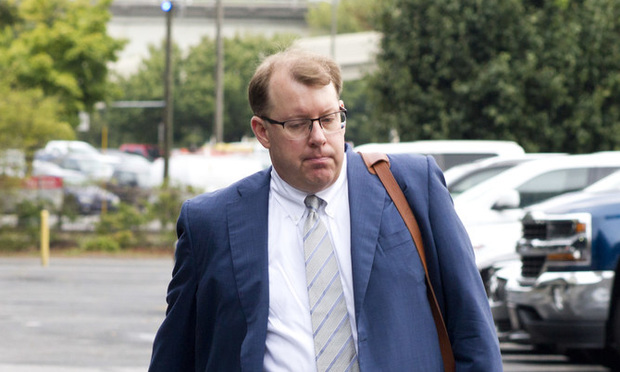Judge Awards $40.3M in Restitution to Victims of Nat Hardwick
Judge Eleanor Ross ruled late Thursday that former law firm partner Nathan Hardwick IV and a co-conspirator were both liable for recompensing Hardwick's ex-partners and Fidelity National Title Insurance.
May 09, 2019 at 09:58 PM
6 minute read
 Nathan Hardwick enters the federal courthouse in Atlanta on the fourth day of testimony in his trial on charges of embezzlement. (Photo: John Disney/ALM)
Nathan Hardwick enters the federal courthouse in Atlanta on the fourth day of testimony in his trial on charges of embezzlement. (Photo: John Disney/ALM)
Federal judge Eleanor Ross awarded $40.3 million in restitution on Thursday to the victims of convicted law firm embezzler Nathan Hardwick IV and his co-conspirator Asha Maurya.
The judge held Hardwick and Maurya jointly and severally liable for the sum.
Ross awarded the bulk of that, $23,307,431, to Fidelity National Title Insurance Co. for the losses it incurred backstopping the escrow accounts of Hardwick's now-defunct residential real estate firm, Morris Hardwick Schneider, after multimillion dollar shortfalls in the accounts surfaced in July 2014.
Ross ruled that Hardwick's former law partners, Mark and Gerard Wittstadt, who are brothers, were due $6 million apiece for their losses from the firm's implosion, and that Art Morris, a retired founder of the firm, was due $5 million.
Hardwick was convicted in October on 21 counts of wire fraud, plus conspiracy to commit wire fraud and making false statements to banks, for embezzling millions from Morris Hardwick Schneider to pay for casinos, private jets and women.
Morris Hardwick Schneider was once the largest residential real estate firm in the Southeast.
Maurya was the controller for the firm's closing side during the charged fraud period, from 2011 until July 2014, when what would turn out to be almost $30 million in escrow account shortfalls were first discovered. She pleaded guilty to a single count of conspiracy to commit wire fraud last year for her role in making wire transfers for Hardwick and moving money among the firm's many accounts to cover the shortfalls.
Ross sentenced Hardwick, 53, to 15 years in federal prison on Feb. 12. Now at a federal prison in Ashland, Kentucky, Hardwick did not appear for the restitution hearing.
Ross sentenced Maurya, 43, to seven years in prison the next day. She is due to report to a prison in New Jersey, near her mother, who has health problems, in the next few days.
Thursday's restitution hearing ended at noon in a bit of a cliff-hanger.
The government and the defense had asked Ross for widely divergent restitution amounts. Prosecutors sought $58.3 million, with Hardwick and Maurya jointly and severally liable. Hardwick's lawyer, Kristen Novay of Garland, Samuel & Loeb proposed $6.1 million.
Maurya's lawyer, Jess Johnson of Pate & Johnson, had asked that she be liable only for the $900,000 she'd admitted taking for her own benefit and had agreed to pay in restitution as part of her plea bargain.
Before adjourning, Ross asked for post-hearing briefings from both sides, saying she would make her ruling after considering them.
But federal prosecutor J. Russell Phillips reminded her there is a 90-day deadline for the restitution order after sentencing—and added that it was day 87.
Ross dispensed with the post-hearing briefing and issued her order later that afternoon.
The Victims
The judge awarded Fidelity to the penny what it had asked for in restitution.
Fidelity's lawyer, Ed Burch of Smith Gambrell & Russell, said Fidelity spent $29,530,391 to fund the firm's escrow accounts. He said $2.3 million should be deducted for the fair market value of the firm's title company, Landcastle Title, which Fidelity acquired as part of its agreement to prop up the firm's accounts—along with another $3.9 million that Fidelity had recouped in claims owed the firm.
That left Fidelity with a loss of $23.3 million from the fraud, Burch said.
Fidelity recouped another $3.4 million from insurance, he said, adding that per statute, the company was not deducting that money from its restitution claim. “When you have a crime of conspiracy there is broader scope for the victim,” he explained.
The Wittstadts ran Morris Hardwick Schneider's foreclosure division, a separate operation, from Baltimore. They had each asked for $15 million in restitution.
The bulk of the Wittstadts' losses from the fraud, which surfaced in July 2014, and the firm's subsequent bankruptcy a year later were due to their decimated income, Mark Wittstadt testified at the restitution hearing. Gerard Wittstadt did not testify because he was recovering from surgery, but his brother said their income and losses were similar.
“I've had to start over,” said Wittstadt, 53, adding that he's had to do so handicapped by tremendous damage to his reputation from Morris Hardwick Schneider's failure.
He said his income from Morris Hardwick Schneider dropped from $2.3 million in 2013, the year before the fraud was discovered, to $370,000 in 2015, the year the firm filed for bankruptcy. Instead of making $2.5 million a year, he added, his income is now less than a tenth of that.
“I don't expect to ever get any money from Nat Hardwick or Asha Maurya, but I'm here to make the effort,” Wittstadt said.
Phillips had asked for $5 million in restitution for Morris—the amount the judge ruled he was owed—but Morris testified at the hearing that he lost a lot more than that from the firm's implosion.
Morris said his retirement agreement guaranteed him $350,000 a year and 10% of the firm's profits for a dozen years. There were still 10 years left when the fraud was discovered, which came to $3.5 million in lost retirement income. Morris also paid $1.5 million to Fidelity to help cover the escrow shortfalls.
Morris said he also paid the firm's creditors $600,000 to settle and an additional $700,000 to Fidelity, plus between $300,000 and $400,000 in legal fees.
And his reputation has taken a hit, Morris said. “When I Google myself now, I think my name is Nat Hardwick. That's all I see,” he said.
“It's been painful to see the bankruptcy of a firm I spent 40 years building,” he added.
This content has been archived. It is available through our partners, LexisNexis® and Bloomberg Law.
To view this content, please continue to their sites.
Not a Lexis Subscriber?
Subscribe Now
Not a Bloomberg Law Subscriber?
Subscribe Now
NOT FOR REPRINT
© 2025 ALM Global, LLC, All Rights Reserved. Request academic re-use from www.copyright.com. All other uses, submit a request to [email protected]. For more information visit Asset & Logo Licensing.
You Might Like
View All

Alston & Bird, Baker Hostetler, Holland & Knight Promote Partners in Southeast
5 minute read

Trending Stories
- 1Many LA County Law Firms Remain Open, Mobilize to Support Affected Employees Amid Historic Firestorm
- 2Stevens & Lee Names New Delaware Shareholder
- 3U.S. Supreme Court Denies Trump Effort to Halt Sentencing
- 4From CLO to President: Kevin Boon Takes the Helm at Mysten Labs
- 5How Law Schools Fared on California's July 2024 Bar Exam
Who Got The Work
Michael G. Bongiorno, Andrew Scott Dulberg and Elizabeth E. Driscoll from Wilmer Cutler Pickering Hale and Dorr have stepped in to represent Symbotic Inc., an A.I.-enabled technology platform that focuses on increasing supply chain efficiency, and other defendants in a pending shareholder derivative lawsuit. The case, filed Oct. 2 in Massachusetts District Court by the Brown Law Firm on behalf of Stephen Austen, accuses certain officers and directors of misleading investors in regard to Symbotic's potential for margin growth by failing to disclose that the company was not equipped to timely deploy its systems or manage expenses through project delays. The case, assigned to U.S. District Judge Nathaniel M. Gorton, is 1:24-cv-12522, Austen v. Cohen et al.
Who Got The Work
Edmund Polubinski and Marie Killmond of Davis Polk & Wardwell have entered appearances for data platform software development company MongoDB and other defendants in a pending shareholder derivative lawsuit. The action, filed Oct. 7 in New York Southern District Court by the Brown Law Firm, accuses the company's directors and/or officers of falsely expressing confidence in the company’s restructuring of its sales incentive plan and downplaying the severity of decreases in its upfront commitments. The case is 1:24-cv-07594, Roy v. Ittycheria et al.
Who Got The Work
Amy O. Bruchs and Kurt F. Ellison of Michael Best & Friedrich have entered appearances for Epic Systems Corp. in a pending employment discrimination lawsuit. The suit was filed Sept. 7 in Wisconsin Western District Court by Levine Eisberner LLC and Siri & Glimstad on behalf of a project manager who claims that he was wrongfully terminated after applying for a religious exemption to the defendant's COVID-19 vaccine mandate. The case, assigned to U.S. Magistrate Judge Anita Marie Boor, is 3:24-cv-00630, Secker, Nathan v. Epic Systems Corporation.
Who Got The Work
David X. Sullivan, Thomas J. Finn and Gregory A. Hall from McCarter & English have entered appearances for Sunrun Installation Services in a pending civil rights lawsuit. The complaint was filed Sept. 4 in Connecticut District Court by attorney Robert M. Berke on behalf of former employee George Edward Steins, who was arrested and charged with employing an unregistered home improvement salesperson. The complaint alleges that had Sunrun informed the Connecticut Department of Consumer Protection that the plaintiff's employment had ended in 2017 and that he no longer held Sunrun's home improvement contractor license, he would not have been hit with charges, which were dismissed in May 2024. The case, assigned to U.S. District Judge Jeffrey A. Meyer, is 3:24-cv-01423, Steins v. Sunrun, Inc. et al.
Who Got The Work
Greenberg Traurig shareholder Joshua L. Raskin has entered an appearance for boohoo.com UK Ltd. in a pending patent infringement lawsuit. The suit, filed Sept. 3 in Texas Eastern District Court by Rozier Hardt McDonough on behalf of Alto Dynamics, asserts five patents related to an online shopping platform. The case, assigned to U.S. District Judge Rodney Gilstrap, is 2:24-cv-00719, Alto Dynamics, LLC v. boohoo.com UK Limited.
Featured Firms
Law Offices of Gary Martin Hays & Associates, P.C.
(470) 294-1674
Law Offices of Mark E. Salomone
(857) 444-6468
Smith & Hassler
(713) 739-1250






